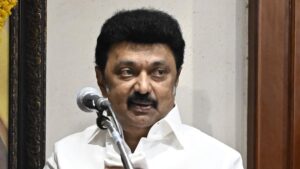Tamil Nadu has finally done what everyone was quietly expecting. It has taken the fight against NEET straight to the Supreme Court. And honestly, this chapter in the NEET debate feels bigger than just an “education policy” tussle. It’s a full-blown constitutional moment about state power, federal balance, and the limits of the President’s assent.
What triggered this battle?
Back in 2021, the Tamil Nadu Assembly passed the Tamil Nadu Admission to Undergraduate Medical Degree Courses (Amendment) Bill. Its goal was simple: scrap NEET in the state and go back to admissions based on Class 12 marks using a normalisation system.
The Bill wasn’t a political gimmick. It passed unanimously. Every party supported it, because Tamil Nadu has long argued that a single national exam disadvantages students from rural backgrounds, state board students, first-generation learners, and those without access to coaching factories.
Then the Bill went to the Governor.
The Governor sat on it.
And sat.
And sat.
Finally, he reserved it for the President. And recently, the President withheld assent.
That refusal is what pushed Tamil Nadu to the Supreme Court.
What Tamil Nadu is arguing in court
The State’s petition is quite direct. It says the President’s refusal is:
- Unconstitutional
- Without reasons
- In violation of Articles 201 and 254(2)
- A blow to federalism
They highlight that once a Governor reserves a Bill for the President, the President must act constitutionally, not mechanically. The State says the President withheld assent solely based on the Centre’s advice, without independently considering the Bill or giving a single explanation.
Tamil Nadu is also using a fresh Supreme Court judgment to strengthen its stand- the April 2025 ruling in State of Tamil Nadu v. Governor of Tamil Nadu, where the Court held that Governors cannot stall legislation indefinitely or exercise a pocket veto. If Governors can’t delay arbitrarily, can the Centre do the same through the assent process? That’s the core of the legal question here.
So what exactly does the State want?
Tamil Nadu has asked for two main outcomes:
1. The Supreme Court should declare that the withholding of assent is invalid.
If the refusal was unconstitutional or not based on reasonable reasons, the Court can strike it down.
2. The Court should declare the Bill as “deemed to have received assent” under Article 254(2).
This is bold.
Article 254(2) allows a state law (even if inconsistent with a central law) to operate if it gets Presidential assent. Tamil Nadu wants the Court to step in and grant that effect because the refusal was flawed.
Alternatively, the State is asking the Court to send the Bill back for proper reconsideration instead of leaving it in limbo.
The deeper issue: NEET itself
The petition doesn’t stop at the assent battle. Tamil Nadu has openly criticised the structural issues with NEET:
- Frequent paper leaks
- Impersonation cases
- Coaching-driven inequality
- Cultural and linguistic disadvantage
- A single exam deciding the future of thousands
The State argues that NEET doesn’t measure whether a student can be a good doctor; it measures whether a student can crack an entrance format that thrives on coaching.
Their proposed alternative — Class 12 performance + normalisation — was designed to widen access, not shrink it.
Why this case matters beyond Tamil Nadu
This case is not just about NEET or medical admissions. It goes much deeper:
- Can the Centre indirectly block state laws by withholding assent indefinitely?
- Does the President need to give reasons for rejecting a Bill?
- How much power does a State actually have when Central and State laws conflict?
- What is the boundary of federalism in India?
If the Supreme Court rules in Tamil Nadu’s favour, other States may also challenge NEET or push harder for localised admission policies. If the Court sides with the Centre, the message will be clear: national entrance exams and centralised education policies override state concerns.
Either way, the judgment will reshape the federal landscape.
What’s the current scenario
Tamil Nadu filed the petition on 15 November 2025.
The Supreme Court has taken note of the matter.
Arguments are expected to revolve around constitutional principles, not just the merits of NEET.
The Court’s decision will decide whether Tamil Nadu can bring back its old admission system — and whether the President’s refusal can be challenged at all.
Final thoughts
This case feels like one of those moments where law, politics, education, and constitutional philosophy collide. NEET has always had supporters and critics, but this time, the battle is in the country’s highest court — and the outcome could set a precedent for decades.
What do you think?
Should Tamil Nadu be allowed to remove NEET?
Or does a national exam ensure fairness and uniformity?
Drop your thoughts below!




